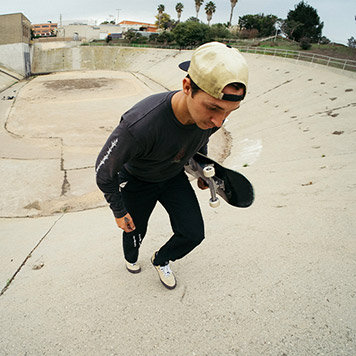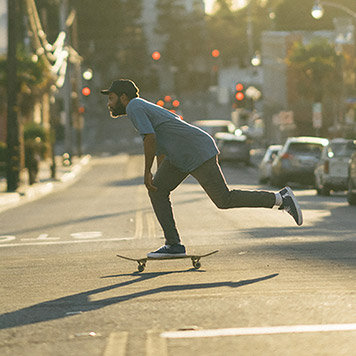The female skateboarders proving that it is no longer just a sport for men
When skateboarding was born in the late 1950s, it was considered to be a very male-dominated scene, with very little room for the inclusivity of others. But with increasing take-up of the sport and pioneers paving the way, there are now more women than ever grabbing their boards to show what they can do.
In this article, we’ll look at some of the most influential female skaters in the sport and how they’ve made a statement when it comes to female skateboarders.
Lizzie Armanto
Lizzie Armanto is one of the most well-known female figures in skating today, and through her successful career to date she has helped to pave the way for other women to prove that skating isn’t just a sport for men.
Lizzie found her love of skating in 2007 and in the 2010-2012 season, she won first place overall in the World Cup of Skateboarding points race. Since this early career win, Lizzie has found success in numerous competitions, from winning the first Women’s Skateboard Park Event at X Games in 2013 to acing the Van Doren Invitational in 2014. If that wasn’t enough, Lizzie also became the first woman to complete Tony Hawk’s infamous 360-vertical loop and will represent Finland’s national skateboarding team in their bid to appear at the 2020 Tokyo Olympics.
Brighton Zeuner
Introduced to skateboarding by her father and brother as a child, Brighton Zeuner is currently one of the youngest female skateboarders on the scene. Consistently juggling her schoolwork and professional skating career, she is fast becoming a solid role model for young girls aspiring to get into the sport.
At just 13 years old, Brighton won her first title at the X Games, making her the youngest champion gold medallist in the history of the games. She is currently ranked as the third-best female skater in the world and is one of the 16 members of the USA inaugural skateboarding national team. Not only that, but she’s leading the way for female skateboarders as part of the Vanguards girls, putting their signatures on a new skating movement.
Elissa Steamer
A veteran of the skating world, Elissa Steamer, began skateboarding in 1989 and got her big break in the skate video “Welcome to Hell’. She is often referred to as one of the first professional female skateboarders and is a true pioneer when it comes to acceptance of women in the sport.
Elissa won the first major Women’s Skateboarding Street competition at the Slam City Jam in 1998 and was the first female skateboarder to be featured in a Tony Hawk video game. Without ever intentionally skating to empower women, Elissa’s attitude towards skateboarding and her goal to be a great skater regardless of gender has rendered her an excellent role model for young women.
Yndiara Asp
A rising star on the skateboarding scene, Yndiara, or Yndi, is making a name for herself with some impressive early-career achievements. Her professional career started in 2018 with a second-place finish at the Vans Park Series in her home nation of Brazil and her success has continued from there.
Later in 2018, Yndi won first place in the Vans Park Series in China and in 2019 came second in the Red Bull Bowl Rippers in France. Whilst pursuing her professional career in skateboarding, Yndiara also attends college, proving that it’s possible for women to forge a successful sports career without compromising on education.
Lacey Baker
Lacey Baker has been skateboarding since the age of 5 and with an overall ranking of 43rd, is arguably one of the best skaters in the world today. At just 13, Lacey became one of the youngest skaters ever to medal at the X Games.
Alongside phenomenal skating talent, Lacey was the first openly queer woman to join the Nike skateboarding team and has since become one of the biggest advocates for the LGBTQ community in the sport.
Mami Tezuka
After being introduced to skateboarding by her parents, Mami Tezuka started skating at the tender age of 6 and has since gone on to compete across the world in some of the most high profile competitions in the sport.
Mami is one of the youngest skaters on the scene today but her distinguished style and passion for bringing rhythm to the sport is something that has made her stand out from others. As a relatively young skater, Mami also has other hobbies which include piano and snowboarding; meaning she is able to bring the skills learned in these disciplines to her personal skating style.
Leticia Bufoni
Hailing from Sau Paulo, Brazil, Leticia Bufoni grew up playing sports in the street with other children and first started skateboarding at the age of nine when her grandmother bought her a skateboard. She has now become one of the most influential skaters in the sport.
Leticia competed in the X Games in 2007 at the age of 14 and although she didn’t win, she made the decision to move to Los Angeles and work hard to make it as a professional skateboarder. Her hard work paid off; Leticia is now a five-time X Games gold medallist and has won several awards and topped numerous rankings charts. In 2018, Forbes named Leticia as one of its ‘Most Powerful Women in International Sports for 2018’.
Girls from across the globe have come together in recent years to prove that gender is not a defining factor when it comes to skateboarding ability and it’s really had an impact. With four women currently listed in the top 20 of the Global Skateboard Rankings and more women than ever competing in the sport, it’s clear to see why now is an exciting time to be a female skateboarder.
These influential and successful women are now paving the way for future generations of female skateboarders who will come onto the scene at a time when gender is no longer an issue and skaters are judged solely on their skill and ability; proving that skateboarding is no longer just for men. What a great time to be a woman.









